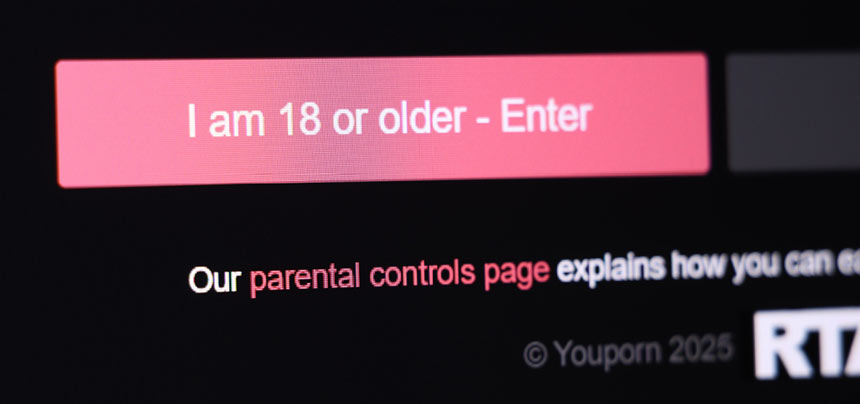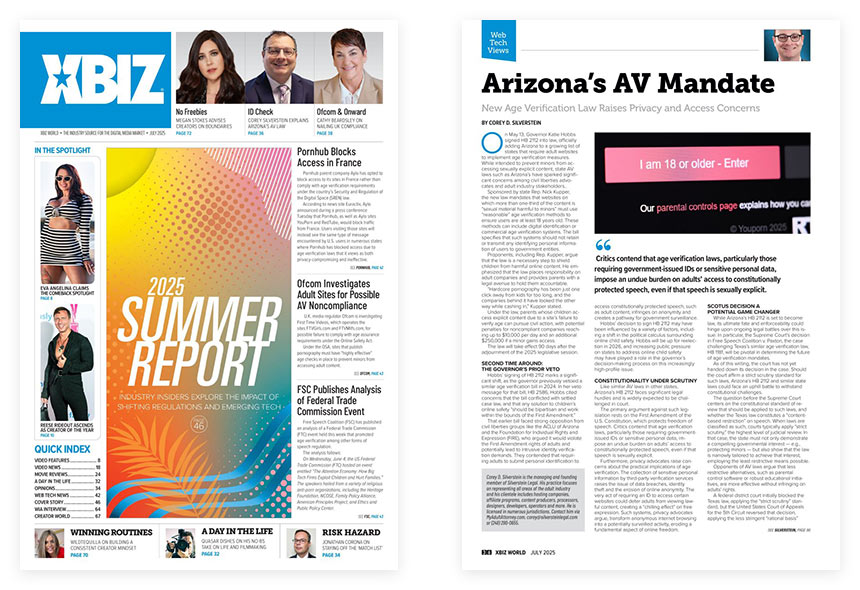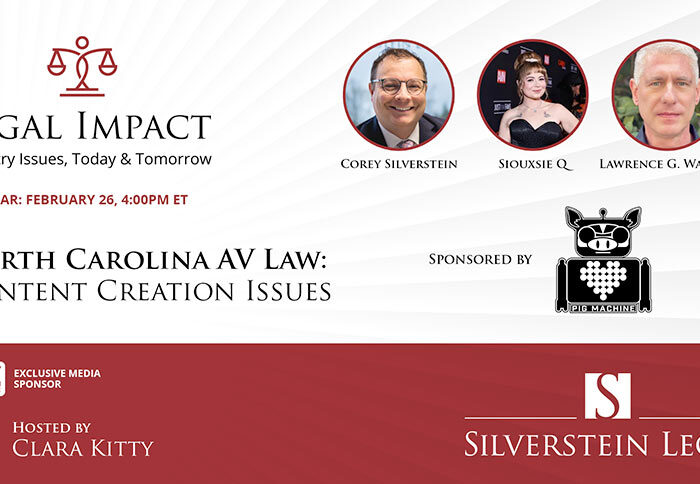Cyberspace (February 4, 2026) - Corey D. Silverstein, the driving force behind MyAdultAttorney.com and Adult.Law,…

House Bill 2112
Arizona has officially joined a growing list of states requiring commercial adult websites to implement robust age verification measures, aiming to prevent minors from accessing sexually explicit content. Governor Katie Hobbs signed House Bill 2112 (HB2112) into law on May 13, 2025, a move that has been met with both applause from proponents of child protection and significant concerns from civil liberties advocates and the adult entertainment industry.
Featured In The July 2025 Edition Of XBIZ World

The new law, sponsored by State Representative Nick Kupper, mandates that websites where more than one-third of the content is “sexual material harmful to minors” must use “reasonable age verification methods” to ensure users are at least 18 years old. These methods can include digital identification or commercial age verification systems. Crucially, the bill specifies that such systems should not retain or transmit any identifying personal information of users to state or federal government entities.
Proponents, including Representative Kupper, argue that the law is a necessary step to shield children from harmful online content. “Hardcore pornography has been just one click away from kids for too long, and the companies behind it have looked the other way while cashing in,” Kupper stated. He emphasized that the law places responsibility on these companies and provides parents with a legal avenue to hold them accountable. Parents whose children access explicit content due to a site’s failure to verify age can pursue civil action, with potential penalties for non-compliant companies reaching up to $10,000 per day and an additional $250,000 if a minor gains access.
What the Law Requires
Targeted Sites
Any commercial website where over one third of content is “sexual material harmful to minors” must comply.
Age Verification
Visitors must prove they’re 18+ by either uploading a government-issued digital ID or using a third-party age verification service that may rely on government ID or transactional data.
Privacy Safeguards
Verification vendors may not retain any identifying data, and the law prohibits any sharing of this data with government entities.
Failure to comply triggers stiff penalties:
- $10,000 per day of non verification,
- $10,000 per incident of improper data retention, and
- A $250,000 fine if a minor gains access due to noncompliance.
Enforcement tools include actions by the Attorney General or private legal suits by affected individuals.
A Second Attempt: The Governor’s Prior Veto
This recent signing of HB2112 marks a significant shift, as Governor Katie Hobbs had previously vetoed a similar age verification bill in 2024. House Bill 2586 (HB2586), which also sought to mandate age verification for websites distributing “material harmful to minors,” was struck down by Hobbs in April 2024.
In her veto message for HB2586, Governor Hobbs cited concerns that the bill “conflicts with settled case law” and that any solution to children’s online safety “should be bipartisan and work within the bounds of the First Amendment.” This earlier bill had faced strong opposition from civil liberties groups like the ACLU of Arizona and the Foundation for Individual Rights and Expression (FIRE), who argued it would violate the First Amendment rights of adults and potentially lead to intrusive identity verification demands. They contended that requiring adults to submit personal identification to access constitutionally protected speech, even adult content, infringes on anonymity and creates a pathway for government surveillance.
The passage of HB2112 in 2025, therefore, represents a successful second attempt by the Arizona Legislature to implement age verification for adult websites, overcoming the governor’s previous objections. This change in approach by Governor Hobbs could be influenced by a variety of factors, including potential revisions to the bill’s language that addressed some of her initial concerns, or a shift in the political calculus surrounding online child safety. It is also important to note that Governor Katie Hobbs is eligible for re-election in the 2026 gubernatorial election, with her current term set to end in January 2027. While it’s speculative to definitively link the two, the increasing public pressure on states to address online child safety, combined with the political landscape of an upcoming election cycle, could play a role in a governor’s decision-making process on such high-profile issues.
Effective Date and Compliance Requirements
Websites falling under the purview of Arizona’s HB2112 will need to comply with the new age verification requirements once the law becomes effective. As with many pieces of Arizona legislation, the law will take effect 90 days after the adjournment of the current legislative session. The Arizona Legislature’s 2025 regular session was scheduled to adjourn on May 23, 2025, but legislative sessions can sometimes be extended. If the session concluded around that date, the compliance deadline for commercial adult websites distributing content to Arizona users would fall around late August or early September 2025.
Upon the effective date, any commercial entity that intentionally or knowingly publishes or distributes “material harmful to minors” on the internet from a website where more than one-third of the content is such material, will be subject to the law’s provisions. This includes implementing the “reasonable age verification methods” outlined in the bill and ensuring that no identifying user information is retained or transmitted to government entities.
Constitutionality Under Scrutiny: A Legal Challenge is Expected
Despite its passage and the stated intent of protecting minors, Arizona’s HB2112, like similar laws in other states, faces significant legal hurdles and is widely expected to be challenged in court. The primary argument against such legislation rests on the First Amendment of the U.S. Constitution, which protects freedom of speech. Critics contend that age verification laws, particularly those requiring government-issued IDs or sensitive personal data, impose an undue burden on adults’ access to constitutionally protected speech, even if that speech is sexually explicit.
The legal challenge will likely center on whether the law constitutes a “content-based restriction” on speech. If classified as such, courts typically apply “strict scrutiny,” the highest level of judicial review. To survive strict scrutiny, the state must demonstrate a compelling governmental interest (e.g., protecting minors) and show that the law is narrowly tailored to achieve that interest, employing the least restrictive means possible. Opponents argue that less restrictive alternatives, such as parental control software or robust educational initiatives, exist and are more effective without infringing on adult rights.
Furthermore, privacy advocates raise concerns about the practical implications of age verification. Mandating the collection of sensitive personal information by potentially unregulated third-party verification services creates vulnerabilities for data breaches, identity theft, and the erosion of online anonymity. The very act of requiring an ID to access certain websites could deter adults from viewing lawful content, creating a “chilling effect” on free expression. The argument is that such systems transform anonymous internet Browse into a potentially surveilled activity, eroding a fundamental aspect of online freedom.
The ongoing legal battles, particularly the Supreme Court’s decision on the Texas law, will be pivotal in shaping the future of age verification mandates. Should the Supreme Court affirm a strict scrutiny standard for such laws, Arizona’s HB2112 would face an uphill battle to withstand a constitutional challenge.
Looming Supreme Court Decision on Texas Law: A Potential Game Changer
While Arizona’s HB2112 is set to become law, its ultimate fate and enforceability could hinge on a crucial upcoming decision from the U.S. Supreme Court. The High Court has heard oral arguments in a case challenging Texas’s age verification law (HB 1181), a similar measure that went into effect in 2023. The lawsuit, Free Speech Coalition et al. v. Paxton, pits free speech advocates and the adult entertainment industry against the state of Texas.
The core of the Supreme Court’s deliberation centers on the constitutional standard of review that should be applied to such laws. A federal district court initially blocked the Texas law, applying a “strict scrutiny” standard, which requires the state to prove a compelling governmental interest and demonstrate that the law is narrowly tailored to achieve that interest using the least restrictive means. However, the Fifth U.S. Circuit Court of Appeals later reversed that decision, applying a less stringent “rational basis” review, which only requires the law to have a legitimate state interest with a rational connection.
A Supreme Court ruling in favor of the adult industry and the application of strict scrutiny would set a powerful precedent, potentially invalidating not only Texas’s law but also similar age verification laws in Arizona and more than a dozen other states. If the Court upholds the Fifth Circuit’s more lenient standard, it would bolster the legal foundation for these state-level age verification requirements, potentially encouraging even more states to enact similar legislation.
The Supreme Court is expected to issue its decision on the Texas case by the end of its current term, which typically concludes in June. Given the timing, this ruling could come just as Arizona’s law is set to become effective or shortly thereafter, creating immediate legal implications and potentially requiring rapid adjustments for adult content providers and Arizona citizens alike.
Ongoing Concerns and Future Implications
The legal battles surrounding these age verification laws highlight a broader tension between child protection, adult privacy, and First Amendment rights in the digital age. Critics, including the ACLU of Arizona and organizations within the adult entertainment industry like the Free Speech Coalition, argue that these age verification mandates infringe upon the privacy rights of adults and could lead to a de facto government surveillance system.
There are also significant concerns about the potential for data breaches and identity theft, even with the law’s stipulations against data retention and sharing. The adult entertainment industry has previously warned that such laws are expensive and complicated to implement, potentially forcing users to hand over sensitive personal information to third-party verification companies with questionable oversight. Some major adult content platforms have already blocked access to users in states with similar laws, opting to avoid the legal and logistical complexities.
Furthermore, some experts suggest that these laws may not be effective in their stated goal of preventing minors from accessing adult content. Research on similar laws in other states indicates that while traffic to compliant websites may decrease, users, including minors, often migrate to less regulated or entirely non-compliant platforms, or utilize Virtual Private Networks (VPNs) to circumvent geographic restrictions. This could inadvertently push users towards riskier corners of the internet with fewer safeguards.
As Arizona’s new law is expected to take effect in the coming months, its full impact on user behavior, industry practices, and ongoing legal battles will be closely watched, especially considering the impending Supreme Court decision that could redefine the landscape of online age verification nationwide.
This article does not constitute legal advice and is provided for your information only and should not be relied upon in lieu of consultation with legal advisors in your own jurisdiction. It may not be current as the laws in this area change frequently. Transmission of the information contained in this article is not intended to create, and the receipt does not constitute, an attorney-client relationship between sender and receiver.
About Silverstein Legal
Founded in 2006 by adult entertainment lawyer Corey D. Silverstein, Silverstein Legal is a boutique law firm that caters to the needs of anyone working in the adult entertainment industry. Silverstein Legal’s clients include hosting companies, affiliate programs, content producers, processors, designers, developers, and website operators.




